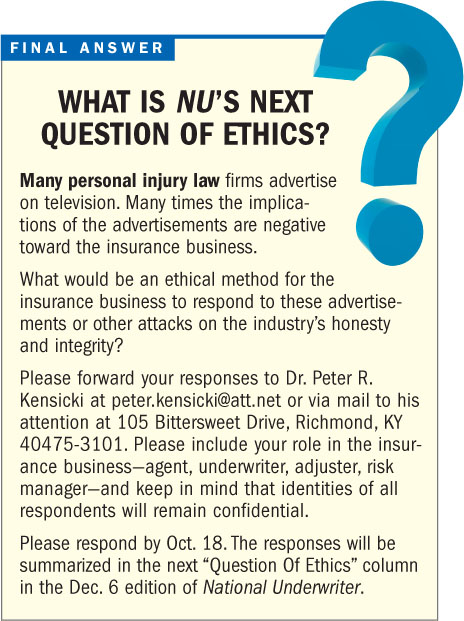The question posed to readers of National Underwriterfor this column was provocative: “Is it ever ethical to beunethical?” The question, which also requested examples, is basedon law that occasionally allows an individual the “right to do thewrong thing” under certain circumstances.
|Some refer to this as a “privilege” based on the legal conceptof malum prohibitum, or “crime for the greater good.”
| Theexample cited in the question was speeding, which is clearly“wrong.” However, if a person is speeding to take a severelyinjured person to the emergency room, the illegal speeding may belegal–under those circumstances.
Theexample cited in the question was speeding, which is clearly“wrong.” However, if a person is speeding to take a severelyinjured person to the emergency room, the illegal speeding may belegal–under those circumstances.
Every person responding generally agreed that, at the veryleast, rarely is it ethical to be unethical. Almost half repliedthat it was never possible.
|A property underwriter cited an example of an orphanage in aflood zone that would have to close due to an unaffordable premiumunless someone “modified” the flood report. Society and thechildren would be better off with the orphanage, and there would bea small chance the insurer would be harmed.
|However, he wrote, “insurance is governed by utmost good faithwith relevant facts disclosed without concern about where the factstake us. Without that trust, risk and premiums increase for all. Ido not believe it is ever ethical to be unethical in the insurancebusiness.”
|A Midwestern operations manager agreed: “We have a duty to ourpolicyholders and owners to conduct ourselves in an ethical manner.Rates reflect losses and must be based on claim settlementsappropriate to the merits of the claim. I cannot think of a claimsexample where unethical decisions are ethical.”
|An insurance executive from Florida added additional support: “Ican see instances where lying to save someone's life or protect aninnocent person would be acceptable in dire circumstances. However,these situations do not arise during the course of a normalinsurance transaction.”
|He added that “insurance is based on trust that the company willmake good on its contractual promise to pay if the premium is paid.Unethical behavior destroys that trust and cannot be tolerated oraccepted.”
|An insurance attorney was very clear: “In the insurance businessit is NEVER ethical to be unethical. Never say never, but I cannotthink of any examples to the contrary.”
|He added that “conducting any part of the insurance business isa privilege, not a right or entitlement. Most clients expectethical behavior and we should, too. We should reject doingbusiness with unethical clients, and while that may be costly,maintaining ethical stability should be paramount. There is onlyethics, and one cannot separate personal lives from professionallives. Unethical behavior follows the person, not the job.”
|The respondent concluded that “in the final analysis, nounethical act can ever be rationalized as ethical behaviorregardless of the motivation or outcome.”
|The speeding example in the question was rejected by a largenumber of respondents. For example, a Florida insurance consultantnoted: “Ethics are founded on 'who you are' and laws on 'what youshould do.' Ethics is broader, has a global application and is notconfined to legal rules and regulations. Ethics cause you to do theright thing.”
|This respondent added that “failure to disclose informationrelevant to a risk or payment of an uncovered claim for humane orcompassionate reasons, while seemingly justified, cannot beconsidered ethical behavior. It is not ethical to be unethical inthe insurance business or elsewhere.”
||The other side presented situations where they believe anunethical decision would be ethical. One such straightforwardresponse was from an insurance education director: “To help agrieving parent or loved one, it is always fine to say somethingthat would make them feel better even if it was a white lie. Somefolks need to remember the good in others and the truth couldalways wait in the wind.”
|In a similar vein, one person wrote: “A priest was asked thedifference between a sermon and a eulogy at a funeral. The priestreplied, 'The sermon must be the truth.'”
|A residual market executive cited an example of an agentconsidering representing themselves to an insurance company as theinsured to assist the insured with a claim or policy issue. Theagent believes it is the best way to resolve the situation and thatacting as the insured will result in a better response. “This couldbe that time to be unethical and misrepresent yourself,” the agentwrote.
|A Pennsylvania educator and insurance consultant noted that whilecontracts sometimes clearly exclude certain losses, the situationsurrounding the loss may be such that the claim should be paid.
Pennsylvania educator and insurance consultant noted that whilecontracts sometimes clearly exclude certain losses, the situationsurrounding the loss may be such that the claim should be paid.
“I recall an incident when an estranged husband, not living athome and angry with his wife, burned their home,” this respondentnoted. “Both husband and wife were named insureds, and an exclusionclearly eliminated coverage if either named insured deliberatelycaused the loss. The innocent wife would be penalized. In myopinion, it would have been ethical for the insurer to acknowledgethe technical application of the exclusion but pay the claim to thewife.”
|A Pennsylvania underwriter used a similar argument to justify anotherwise uncovered auto loss: “A mother accidentally locks hervery young child in the car on a hot day. The husband is an houraway, a locksmith can be there in 45 minutes, and the firedepartment strongly suggests doing anything to get the child out ofthe car immediately. The mother smashes the window to remove thechild.”
|Again, a deliberate act exclusion applies to the comprehensiveor other than collision loss, noted the underwriter, whilereporting that “if a passerby or the fireman had broken the window,there would be coverage, but there was no coverage for the mother'sact and the adjuster denied the loss. On review, the insurerreversed the decision and paid. Sometimes a 'right' coveragedecision is the 'wrong' decision. I guess this speaks tosituational ethics.”
|A New York broker identified these types of situations this way:“One has to define what is either ethical or unethical becausethere are shades on the spectrum open to different interpretationsby different ethical people. What is clearly unethical to one isethical to another.”
|He called for human judgment in decision-making, citing thisexample: “A contractor operating north of New York City may do afavor and help someone in the city once every five-to-10 years. Acomputer model underwriting program will reject any applicant who'works in NYC.' I do not believe 'once in five-to-10 years'qualifies as 'works in NYC.' Yet if I strictly interpret thephrase, an excellent risk will be rejected. Oh, for a human beingto whom I could explain this insignificant incidental exposure andethically and morally have the contractor insured.”
|An Arizona underwriter had similar views: “Unfortunately, ethicsis in the eye of the beholder. While it seems ethics are a setstandard, it doesn't always work out that way. Sometimes a strictethical 'standard' must be ignored and a decision made based onright or wrong.”
||He gave two examples. The first involved a potential technicalviolation of the law. “An insured with a six-figure premium ispaying less because the agent contributed some commission to reducethe premium. This may be a violation of an anti-rebating law. Butthe client, the agent and the insurer benefit by providing the bestinsurance and risk management program available. This is anexception that should be made, and I do not see it asunethical.”
|His other example involved an underwriting manager with a biasagainst a class of business. “An underwriter aware of this bias,perhaps based on verbal instructions relative to writing this classof business, is required to decline the risk. The underwriter could'mentor' the agent to appeal an actual or potential declination toa manager further up the ladder, who would judge the risk on itsmerits and not on prejudice for the class. This, too, is notunethical, in my opinion.”
|An anonymous respondent provided this example of what theyconsidered an ethical yet unethical decision: “A risk must berejected only because of redlining by an insurer. An underwriterwill be unethical if he or she rejects the risk because redliningis illegal. The underwriter will be unethical if it accepts therisk because that is a clear violation of an underwriting rule. Ibelieve the proper, yet technically 'unethical' decision, is toaccept the risk if it is otherwise qualified.”
|An Indiana claims executive responded that “it is okay to breakthe law or violate a company rule if the law or rule didn'tcontemplate the current situation, and the behavior is in the bestinterest of the parties involved.”
|This respondent cited an example “from the early days of theself-storage business. Originally such facilities were classifiedand rated as classic warehouses. Some underwriters decided toindependently rate them based on the actual risks rather thantraditional warehouse class risks. Having said that, one needs tobe very careful before going down that road. If you wouldn't wantyour action as the lead item on Action News, your action isprobably not ethical in any event.”
|An association executive began his response: “Your question isparadoxical. By definition an act cannot be ethical and unethicalat the same time–just as something cannot be hot and coldsimultaneously. But the question gets to the heart of ethicalabsolutes versus ethical relativism.”
|He noted that many scholars searched for absolute ethicalstandards by which all actions could be measured–much like we havein mathematics or physics. This is, in part, why ethical codes aredeveloped to identify what actions are either ethical or unethical.“What conduct is not congruent with the code is 'unethical' bydefinition.”
|He then cited an example of the use of deception, which isgenerally considered unethical. “Wasn't it ethical to lie to aThird Reich SS officer asking if you are hiding a Jew in your home?I believe that while lying to the SS officer would be unethical,being unethical in that case was the right thing to do.”
|He concluded that “in a perfect world, what is ethical wouldalways be moral. But ethics in its application today is more aboutrules of behavior, while morals remain about right and wrongconduct.”
|In summary, the two sides are not that far apart. Almosteveryone would agree that based on ethics codes as written, andassuming that the code defines a breaking of a law as unethical perse, violating any law or established rule of conduct to which wehave subscribed is unethical.
|However, as the association executive noted, we do not live in aperfect world where moral conduct and ethical conduct are always insync. Therefore, while it may not ever be “ethical to beunethical,” it may be more important to be moral and, despite therules and the consequences of violating an ethical code, to do theright thing.
|In other words, it is more important in some instances to bemoral rather than to be ethical.
|Peter R. Kensicki is a professor of insuranceat Eastern Kentucky University in Richmond, Ky., as well as amember of the Ethics Committee of the CPCU Society in Malvern, Pa.He may be reached at [email protected].
Want to continue reading?
Become a Free PropertyCasualty360 Digital Reader
Your access to unlimited PropertyCasualty360 content isn’t changing.
Once you are an ALM digital member, you’ll receive:
- All PropertyCasualty360.com news coverage, best practices, and in-depth analysis.
- Educational webcasts, resources from industry leaders, and informative newsletters.
- Other award-winning websites including BenefitsPRO.com and ThinkAdvisor.com.
Already have an account? Sign In
© 2024 ALM Global, LLC, All Rights Reserved. Request academic re-use from www.copyright.com. All other uses, submit a request to [email protected]. For more information visit Asset & Logo Licensing.








